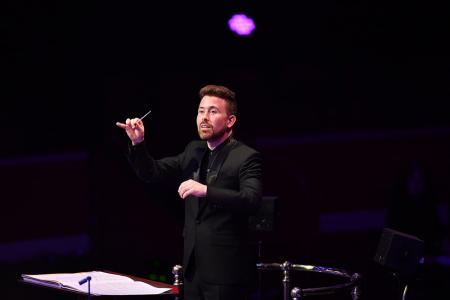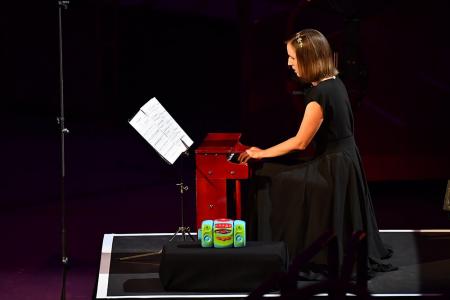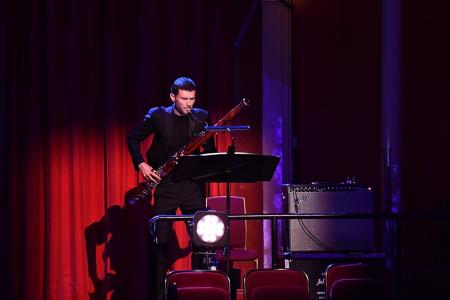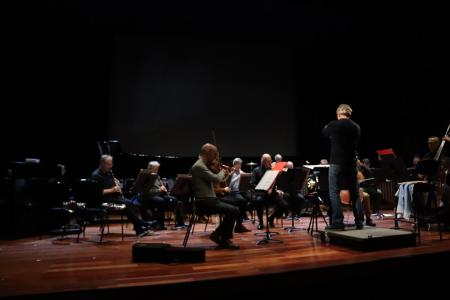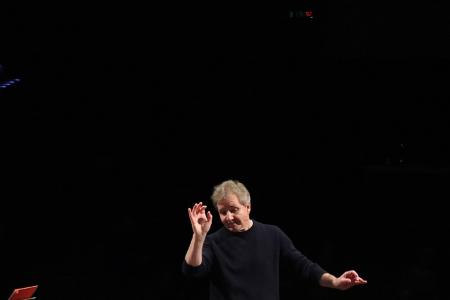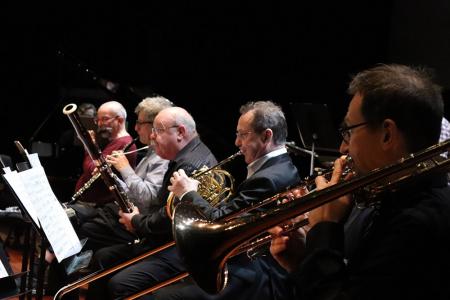Read some of our highlighted reviews from our latest concerts.
London Sinfonietta/Kaziboni review — a striking programme of black composers – Richard Morrison, The Times ★★★★
I think I’ve heard British orchestras playing more music by black composers in the past four weeks than in the preceding 40 years. And I wasn’t actively avoiding it during those decades. The tragedy is that it took a violent death to start this long overdue revolution.
Six of those composers, all living, were featured in this excellent London Sinfonietta concert conducted by the young Zimbabwean-born Vimbayi Kaziboni, who clearly knows his way round an avant-garde score. I enjoyed all of their pieces, although only after returning home and listening to a couple again on the Radio 3 broadcast to discover the elements of the pieces that weren’t relayed to the handful of us sitting in the hall. Note to BBC: there’s no point in having critics present for a live recording if you give them only half the music.
The main loser from this was Sanctum by the New Orleans composer Courtney Bryan, who layered the voices of preachers and social-justice activists into her politically charged soundscape. And two songs from the Ghanaian-British composer Leila Adu-Gilmore’s Freedom Suite made much more sense with Elaine Mitchener’s vocals actually audible. There’s a fascinating, counterintuitive disconnection between Adu-Gilmore’s laid-back, ethereal musical style and her angry subject matter.
Read the full review here (only available with an online subscription).
London’s Southbank orchestras come back to life - Richard Fairman, The Financial Times ★★★
The London Sinfonietta’s “Reassemble Online” was very different, an eight-hour marathon, partly live, partly recorded, adding up to a giant overview of where the ensemble is now. Interspersed with composer and performer interviews, the programme includes a live section of new pieces for solo instruments, as varied as the premiere of Gavin Higgins’s Dacw ’Nghariad I for viola, based on a Welsh folk song, and David Lang’s perky Lend/Lease duet for piccolo and percussion. Among the recorded items, it was a shame Shiva Feshareki’s Orbit/Parhelion 360 was not longer, as its 360-degree ambisonics brought Doctor Who-like, sci-fi music into the 21st century with panache.
Best was the brilliant animated film of Richard Ayres’s No 50 (The Garden), a London Sinfonietta co-commission to mark the ensemble’s 50th anniversary. This was overlaid with footage of the live performance of the piece at the Queen Elizabeth Hall last year. It tells the whimsical story of a man digging down from his garden to hell and has a starring role for an ancient bacterium (how did Ayres know?). The music is a riot of one man’s witty imagination.
See the full review here (only available with an online subscription).
Prom: London Sinfonietta/Paterson review — the empty space could not dampen the performers’ energy - Geoff Brown, The Times ★★★★
The last work, Steve Reich’s City Life, gave Tuesday’s Prom its theme. Jostling crowds, neon lights, urban dirt: all found a prominent home in the London Sinfonietta’s contemporary repertoire, American and British. They were not, however, what home viewers saw as we followed the BBC cameras swooping over the darkened tiers of the Royal Albert Hall, pinpricked with hopeful little lights and a few strange gusts of blue smoke. No wonder the prowling lines of the opening piece, Philip Glass’s Façades, sounded so elegiac.
Happily, all the empty space could not defeat the energy of individual performers. Who could resist the forceful clatter of Clíodna Shanahan thumping out Julia Wolfe’s joyfully brief East Broadway on a battered toy piano, suitably accompanied by a toy boombox with flashing lights? Jonathan Davies equally excelled in Anna Meredith’s crazy solo piece Axeman, the next best thing to hearing Jimi Hendrix play an electric bassoon. Thank goodness spare Sinfonietta members were always available to supply live applause.
Read the full review here.
BBC Proms live online: London Sinfonietta, Paterson review – varied perspectives on city life - Bernard Hughes, Artsdesk
In reviewing Sunday night’s LSO Prom I was impressed by the innovative and exciting programming and that was also a hallmark of Tuesday’s Prom, although this was more true to form for the London Sinfonietta. Since its inception the Sinfonietta has sampled both ends of the contemporary spectrum and everything in between, and that was the case here. The theme was “city life” but the music was also united, as the conductor Geoffrey Paterson said, by having pulse – and sometimes more than one at the same time.
The most pulsing – if not pulsating – piece was Philip Glass’s Façades and actually the regular flow in the strings took a few moments to settle. After that this flat bedrock provided the perfect blank backdrop for a pair of soprano saxophones. Façades has long been a favourite backing track of documentary makers and it is clear why: although you can find it on many a “chillout classics” playlist it actually has a distinctly unrestful, haunting quality. The sax melodies – mostly plain scales – were played hypnotically by Simon Haram and Amy Green and the piece doesn’t outstay its welcome, not always the case with Glass.
Read the full review here.
City Life grooves with the London Sinfonietta at the Proms - Hugh Morris, Bachtrack
At a time when the streets of our cities fall into an uncomfortable silence, a concert bound together by the pulse, rhythm and clamour of urban life feels oddly nostalgic. But, wary of indulging too much in thoughts of ‘what might have been’, the London Sinfonietta assembled a varied programme of old and new in the unofficial ‘contemporary music Prom’ of the 2020 festival.
Beginning with Philip Glass’ Façades, this shuffling short is certainly at the gentle end of the Sinfonietta’s vast range. Out of Glass’ misty smokescreen came music closer to our expectations: Julia Wolfe’s East Broadway for toy piano and (toy) boombox, originally written for the instrument’s standard-bearer Margaret Len Tang. Clíodna Shanahan, making her BBC Proms solo debut on a busy evening for the Sinfonietta’s keyboard players, brought out the piece’s violence through intense clusters and double-armed spreads, coming close to the timbral limitations of this most eccentric of instruments.
Read the full review here.
London Sinfonietta/ Fischer review - Geoff Brown, The Times ★★★★
....the Sinfonietta, elegantly conducted by Thierry Fischer, took wing, blowing, scraping, bubbling and sighing through selected samples from 100 years of contemporary music.
The thread being followed, a valuable one, was the texture and colours of musical sounds and their inner workings. Benno Sachs’s 1920 chamber arrangement of Debussy’s Prélude à l’après-midi d’un faune started us off, its generally pellucid lines gummed up by blobs of impasto from piano and harmonium. Varèse’s 1924 Octandre then jumped out, shrieking and angular, dashed off with brutal aplomb by seven fierce wind and brass players and one emollient double bass.
For the rest, we were in the realm of spectral music, first explored in the 1970s by French composers teasing out the innards of sounds with computer technology and acoustical analysis. Compared with the works he composed later, Gérard Grisey’s pioneering Périodes was unappetising gruel, although with glimpses of the magic to come. Meatier specimens arrived with Kaija Saariaho’s Oi Kuu, in which a bass clarinet and a cello had an “odd couple” romance, and the shimmering colours of Concordanza by Sofia Gubaidulina.
Both, however, were put in the shade by the dizzying, sensuous and joyful panache of Jonathan Harvey’s Sringara Chaconne, music of spiritual purpose but still with a human face. Listening to the Sinfonietta’s nimble and effervescent performance, all doubts faded. This was a concert, proper and glorious.
See the Review here.
Sinfonietta/Fischer review – mystery and awe, from Debussy to Harvey – Tim Ashely, The Guardian ★★★★
The London Sinfonietta’s Sound Across a Century is a two-part set of lecture-concerts, presented by the musicologist Jonathan Cross, exploring the modernist musical revolutions of the 20th century. The second concert will take Schoenbergian atonality as its starting point, but here Cross and conductor Thierry Fischer began with Debussy’s Prélude à l’Après-Midi d’un Faune, examining its influence on instrumental colour and sonority in composers as far apart as Gérard Grisey, Kaija Saariaho, Sofia Gubaidulina and Jonathan Harvey.
The Sinfonietta, of course, play this repertory wonderfully well, though Faune was given in a chamber version prepared by Benno Sachs in 1920 for Schoenberg’s Society for Private Musical Performances in Vienna, which to some extent robbed it of its sensuality. Varèse’s Octandre, with its liberating dissonances and combative dialogues between brass and woodwind, hit home with considerable force. Debussy and Varèse are widely regarded as influencing Grisey’s spectralist Périodes from 1974, its shifting textures beautifully explored here.
Cross reminded us that spectral music, with its emphasis on harmonic overtones and the acoustic properties of sound, can create qualities of transcendental mystery and awe, and the second half of the evening was given over to composers for whom spirituality is paramount. Saariaho’s Oi Kuu (To the Moon) for bass clarinet (Timothy Lines) and cello (Lionel Handy) sounded exquisitely eerie. Gubaidulina’s Concordanza seemed to gaze heavenwards in its search for tremulous glimpses of numinosity, while Harvey’s astonishing Sringara Chaconne, rooted in Buddhist spirituality, unfolded like the repetitions of a mantra, contemplating the unity of the cosmos in the sensuous immediacy of sound.
See the full review here.
Published: 2 Nov 2020
